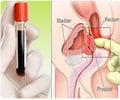For growth, maintenance and cell signaling, cancer cells require amino acids, like normal cells, and L-type amino acid transporters (LATs) are the delivery vehicles that supply them.

To investigate the function of LATs in prostate cancer, Qian Wang, Ph.D., of the Origins of Cancer Laboratory, Centenary Institute, Sydney, Australia, and colleagues studied LAT3 expression in tissue samples from prostate cancer patients, analyzed the function of LATs in cancer cells in vitro, used microarray data to determine which genes and pathways are associated with LAT function, and assessed the role of LAT1 and LAT3 in tumor formation, growth, and metastasis in mice.
The researchers found that LAT3 was expressed at all stages of prostate cancer and that inhibition of LAT proteins inhibits nutrient signaling pathways and over 100 metastasis-related genes, including E2F transcription factors, resulting in cell cycle inhibition. In mice injected with prostate cancer cells, tumor formation, metastasis, and cell cycle progression were all inhibited when the LAT1 or LAT3 gene was knocked out.
The authors conclude that "Targeting LAT transporters, thereby inhibiting leucine uptake, may offer a new therapeutic opportunity for metastatic CRPC, affecting tumor growth and metastasis through inhibition of M-phase cell cycle and mTORC1 signaling pathways." Wang et al. note, however, that further investigation into the long-term effects of leucine deprivation is needed, as well as the effects on other cell types and resistance mechanisms.
In an accompanying editorial, Andrew R. Tee, Ph.D., of the Institute of Cancer and Genetics at Cardiff University, Wales, writes, "Such new evidence explains why malignant prostate cancer has an appetite for amino acids, where these amino acids are quickly utilized to drive their growth and proliferation." Tee adds that this discovery will have huge implications for both prostate cancer studies and therapies.
Source-Eurekalert
 MEDINDIA
MEDINDIA
![Prostate Specific Antigen [PSA] & Prostate Cancer Diagnosis Prostate Specific Antigen [PSA] & Prostate Cancer Diagnosis](https://images.medindia.net/patientinfo/120_100/prostate-specific-antigen.jpg)


 Email
Email










